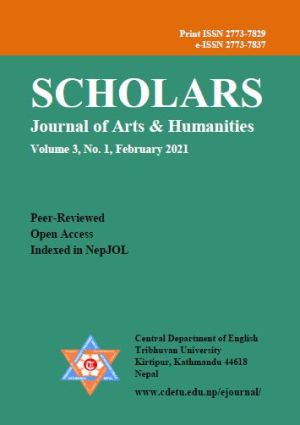Representation of Ethnic Women in Upendra Subba's Lāto Pahāda [Dumb Hill]
DOI:
https://doi.org/10.3126/sjah.v3i1.35374Keywords:
Ethnicity, mainstream literature, ideal womanhood, representation, third wave feminismAbstract
The article aims to examine the images of ethnic women in Upendra Subba's Lāto Pahāda [Dumb Hill], a collection of short stories. The focus of the article is to analyze the portrayal of female characters in the selected five stories from the collection and to explain how they subvert the image of the ideal woman promoted by mainstream Nepali literature. These stories deal with the issues of Limbu people, an ethnic community residing in the eastern hilly region of Nepal. Through them, Subba raises the issues of ethnicity and representation of marginalized people. He explores the pain, suffering and hardship of these people who have been at the margin of the society. The stories, mostly, focus on men who play the primary roles in them; nonetheless, female characters play an important role to make sense of the lifestyle of the Limbu people. Portrayed in the secondary roles as wife, daughter, and mother to the male characters, they maintain equal relation with their male counterparts. They work with self-determination and do not experience male domination in thei lives. To analyze the issues stated above, this paper draws theoretical ideas from third wave feminism which rejects the universalist claim that all women share a set of common experiences. The third wave feminists deny the concept of universal femininity; they clarify that the forms of oppression can be as varied just as resistance to them can have specific local color. The finding of the article suggests that Subba's female characters are depicted in the ethnic background which is nonhierarchical and believes in gender equality. Their portrayal subverts the image of ideal womanhood created and circulated by mainstream Nepali literature.
Downloads
Downloads
Published
How to Cite
Issue
Section
License
© Central Department of English, Tribhuvan University and Authors




